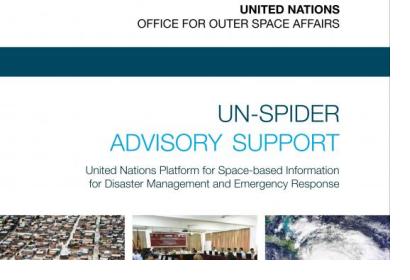The United Nations Platform for Space-based Information for Disaster Management and Emergency Response (UN-SPIDER) has published [a new booklet](/about/publication/tas-booklet) with examples of the programme's technical advisory support activities. UN-SPIDER was established in 2006 based on the recognition that disaster risk management and emergency response communities, particularly in emerging countries, were not fully utilizing space-based technology. To support countries in institutionalizing the use of space-based information in all phases of disaster management, UN-SPIDER regularly carries out advisory support activities upon the invitation of a United Nations Member State. The booklet outlines the advisory support the programme has provided to three Member States: Myanmar, the Dominican Republic and Sri Lanka. In a first step, UN-SPIDER undertook a one-week-long Technical Advisory Mission (TAM) to each of these countries. Accompanied by a group of experts, it assessed the current use of space-based information in disaster management activities based on exchanges with disaster management and development authorities, United Nations organizations, regional and international organizations as well as private sector entities. Since its establishment in 2006, the programme has conducted [35 such missions](/advisory-missions/technical-advisory-missions). At the end of a TAM, UN-SPIDER makes recommendations to the Member State in areas such as policy and coordination, capacity building and institutional strengthening, and accessing and processing of data. UN-SPIDER typically conducts a number of follow-up activities after a TAM, which can take a variety of forms such as stakeholder meetings, workshops or training sessions. In Sri Lanka, for instance, UN-SPIDER conducted four trainings on topics such as "Space Technology for Improving Hazard Mapping" and "Earth Observation Technologies for Flood Risk Mapping, Modelling and Management" following its TAM in 2011. It also worked together with the Disaster Management Centre (DMC) of Sri Lanka to support it in becoming an Authorized User of the International Charter "Space and Major Disasters" in 2017. For the its activation for latest floods in the country in May 2018, the Charter nominated the DMC as project manager. In the Dominican Republic, UN-SPIDER's 2010 TAM was followed by an Institional Strengthening Mission (ISM) to elaborate the terms of reference for the Inter-institutional Geospatial Information Team (EIGEO), which was established in 2013. The EIGEO team brings together professionals from 14 ministries, government agencies, universities and NGOs who have been trained by UN-SPIDER in the use of geographic information systems (GIS) and remote sensing applications. In 2017, the International Charter nominated the team as project manager for its activation for Hurricane Irma. In its advisory support activities, UN-SPIDER draws on the expertise of its network of 22 Regional Support Offices (RSOs). Argentina's National Commission on Space Activities (CONAE), for instance, conducted a training for the EIGEO team in the Dominican Republic, which was facilitated by UN-SPIDER. Regional Support Offices, such as the International Water Management Institute (IWMI) in Sri Lanka, have also worked closely together with local disaster management authorities to respond to emergency situations. By making their expertise available for UN-SPIDER activities, RSOs support the programme in implementing its mandate. Through a country-based perspective on UN-SPIDER's activities, the booklet highlights how long-term engagement with relevant stakeholders in a Member State can facilitate the institutionalization of the use of space-based information in disaster management while strengthening technical capacity and ensuring the state has access to existing international emergency reponse mechanisms. The booklet can be accessed online and downloaded [here](/about/publication/tas-booklet).

